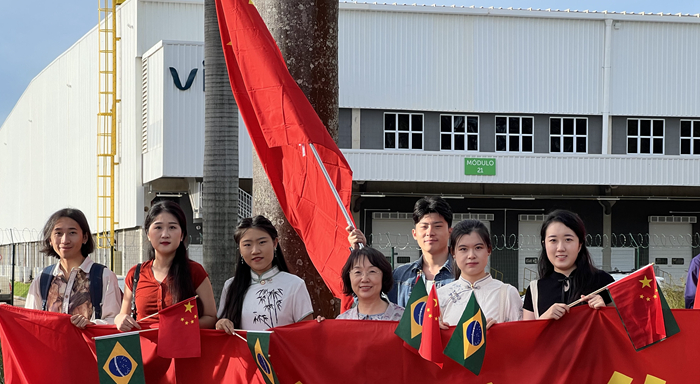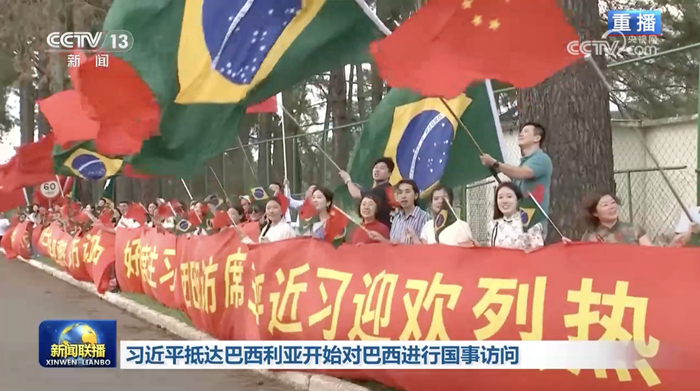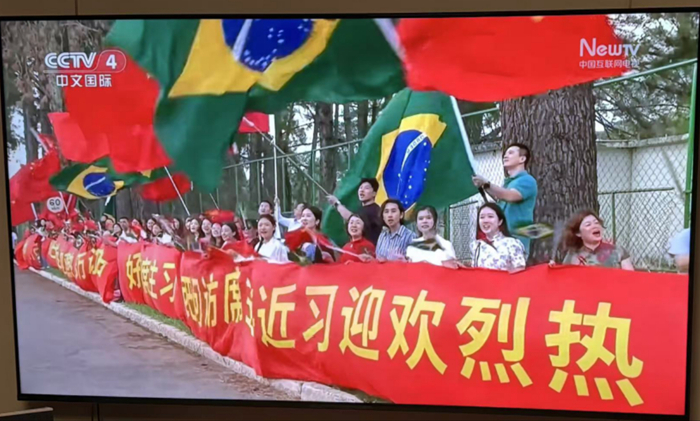On November 20, 2024, Chinese President Xi Jinping began his state visit to Brazil, marking the 50th anniversary of the establishment of diplomatic relations between China and Brazil, and opening a new chapter of friendly cooperation. During this historic visit, the Confucius Institute at the State University of Pará(UEPA), Brazil, took on the reception duties and contributed significantly to the smooth progress of the event.

Careful Preparation, Efficient Execution
To ensure flawless execution of the reception, Sun Jing, the Chinese Director of the Confucius Institute, organized a mobilization meeting during the preparation phase. Tasks were clearly divided, and responsibilities assigned. All teachers collaborated closely, demonstrating a strong sense of responsibility and commitment. Their teamwork provided a solid foundation for the success of the event.
A Bright Performance That Moved Hearts
During the reception, Confucius Institute teachers wore traditional costumes, as well as the emblem of Shandong Normal University and the 50th anniversary medal of China-Brazil diplomatic relations. They warmly welcomed President Xi Jinping. On November 19, as President Xi traveled from the airport to his hotel, and again on November 21, when he departed Brazil, the teachers waved the flags of China and Brazil, shouting “Warm Welcome” and “Long Live Friendship.” Their enthusiasm and the deep friendship between the two nations were captured in numerous reports by Xinhua News Agency, People’s Daily, and CCTV, highlighting their significant role in the reception.

High Recognition and Awards
The outstanding efforts of the Confucius Institute at UEPA were met with high praise from the Chinese Embassy in Brazil. The Institute was awarded the “Outstanding Contribution” trophy, and all participating teachers received commemorative reception badges. Chinese Ambassador to Brazil, Zhu Qingqiao, conveyed President Xi Jinping’s appreciation before his departure: “Everyone worked diligently and conscientiously. The reception was organized very smoothly. Thank you all!”

A Sense of Mission, A Vision for the Future
Volunteers Yin Yue and Dai Yuxin from School of Foreign Languages, along with Wang Xiao from College of International Education, expressed: “It was a great honor to experience such a historic moment and feel the warmth and anticipation for long-lasting friendship between China and Brazil. We are incredibly proud to have contributed to the cultural exchange between the two nations.”
International Education volunteer teacher Shang Ying humorously shared: “I waved the flag with great enthusiasm and shouted with all my might. It was my way of contributing to China-Brazil friendship, and I am filled with pride and joy.”
Ye Fangyu, a volunteer teacher, said: “Participating in this reception has given me a deep sense of mission and responsibility, as well as a renewed passion for teaching Chinese. I look forward to continuing to contribute to the promotion of China-Brazil friendship and cooperation in the future.”
Fang Jingyi, a volunteer from School of Chinese Language and Literature, added: “Working side by side with overseas Chinese to fulfill our reception duties allowed me to deeply feel the cultural heritage of unity and solidarity within the Chinese people. I wish for China-Brazil friendship to flourish, and together, we will write the next golden 50 years.”

Ongoing Efforts to Write a New Chapter Together
Sun Jing, the Chinese Director of the Confucius Institute, stated that under the strategic leadership of the two countries' heads of state, and particularly in light of President Xi Jinping's successful visit to Brazil, China-Brazil relations have entered their best period in history. This presents a significant opportunity for the development of the Confucius Institute. In 2025, Brazil will host the 30th Conference of the Parties (COP 30) to the United Nations Framework Convention on Climate Change (UNFCCC) in Belém, with strong support from China. As a key academic institution in Belém, the State University of Pará is poised to seize new opportunities in this process, especially against the backdrop of deepening China-Brazil cooperation, taking on an enhanced role as a bridge and connector. Looking ahead, the Confucius Institute at UEPA will actively promote Chinese language education and foster cultural exchanges between the two peoples with greater enthusiasm and concrete actions. It aims to contribute to addressing global challenges, advancing sustainable development, and writing a new chapter in China-Brazil friendship.